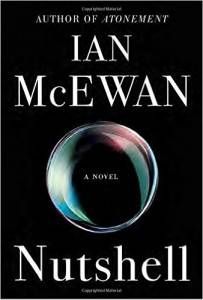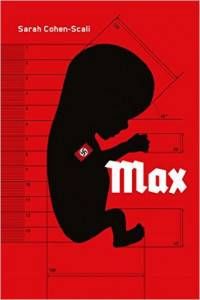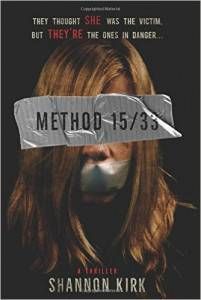
A Few Of The Problems With A Fetal Narrator
 When I first heard about Ian McEwan’s latest novel, Nutshell, I assumed it was a joke. A murder mystery and riff on Hamlet, narrated by a world-weary fetus, written by a 68-year old man might actually be peak old white guy lit fic. Honestly, if you gave me three days to come up with a set-up to a joke about pretentious, masculine literature, I probably wouldn’t have gotten to Nutshell. A second book with a fetal narrator, Sarah Cohen-Scali’s award-winning novel Max, also begins in utero. It’s a more explicitly political novel and the decision to begin in utero makes (slightly) more sense. However, both books accept a deeply problematic premise.
When I first heard about Ian McEwan’s latest novel, Nutshell, I assumed it was a joke. A murder mystery and riff on Hamlet, narrated by a world-weary fetus, written by a 68-year old man might actually be peak old white guy lit fic. Honestly, if you gave me three days to come up with a set-up to a joke about pretentious, masculine literature, I probably wouldn’t have gotten to Nutshell. A second book with a fetal narrator, Sarah Cohen-Scali’s award-winning novel Max, also begins in utero. It’s a more explicitly political novel and the decision to begin in utero makes (slightly) more sense. However, both books accept a deeply problematic premise.
 Two books may not quite be a trend… yet. Still, I think we’ve got to talk about the politics and limitations of fetal narrators before this becomes a thing. As a feminist, advocate for reproductive justice, and reader, I have three related concerns about any book that takes place from the perspective of a fetus regardless of its intent.
Two books may not quite be a trend… yet. Still, I think we’ve got to talk about the politics and limitations of fetal narrators before this becomes a thing. As a feminist, advocate for reproductive justice, and reader, I have three related concerns about any book that takes place from the perspective of a fetus regardless of its intent.
First, in an era when anti-choice lawmakers and activists are using so-called “fetal personhood” laws to roll back reproductive rights, books like Nutshell and Max explicitly affirm that fetuses are whole, independent subjects with freewill, preferences, and opinions. Efforts to recast fetuses as people are part of a coordinated political agenda by anti-choice organizations to criminalize abortion and punish women. Narratives like Nutshell and Max represent the inevitable (if extreme) end-point of this political strategy.
I do not believe that either McEwan or Cohen-Scali intended their books to be anything but thought experiments. However, at this particular moment in time books like this are inherently political. That no one, apparently, asked McEwan about what it means to write from the perspective of a conscious, literate, and urbane fetus astounds me. I’m doubly surprised that precious few of the reviews of Nutshell have pointed out how problematic it is to cast a fetus as a person on par emotionally and intellectually with a 68-year old man.
McEwan is British and Cohen-Scali was born in Morocco and now lives in France, so they might be forgiven for not keeping abreast of American anti-choice activists’ tactics. Even without the threat of changing the law to restrict reproductive autonomy, focusing on the fetus distracts from the humanity of the pregnant person. In Vice, Lynn Paltrow, executive director of National Advocates for Pregnant Women, explained that personhood laws have generated “an extraordinary backlash against women’s equality and status as constitutional persons.”
My second major concern with the fetal narrator is the way it casts pregnant people as being almost solely in service to the fetus that they carry. While it may be appropriate to ask pregnant people to reevaluate their high-risk behaviors in light of a wanted pregnancy, to suggest that all desire should be channeled into the fetus– regardless of what’s best or easiest for the person carrying a child– is small-minded at best and retrograde at worst. While I might forgive McEwan’s narrator for scolding his mother for having a glass of wine, I cannot abide the ways that he talks about his mother’s sexuality. For such a smart fetus, this narrator seems not to understand that his mother needed to have sex to create him.
Finally, stories told from the perspective of the fetus risk reinforcing the idea that some ideology is innate or “natural.” While we may never get a firm answer on the nature v. nurture debate, we do have evidence that racism (or anti-semitism or sexism or homophobia for that matter) is learned. Political and social beliefs are the product of culture, not genes (or at least not only genes). In Nutshell, the fetus already exhibits a tendency toward a certain kind of conservative politics. He resents “trigger warnings” (yes, really) and muses on how he should present as female or black in order to get ahead (the implicit assumption being that white men can’t get ahead any more). Nutshell ends at the moment when the fetal narrator enters the world– apparently a fully formed emotional, intellectual, and physical person. Culture, parenting, and all the messy stuff of this world will not change his views.
To be fair, this is much less of an issue in Max because the story follows Max as he grows up and befriends a young Jewish boy. Although the reader witnesses Max’s ideology change in light of experience, the premise of the book depends on a child being born with a specific ideology (Max works hard to time his own birth to coincide with Hitler’s birthday). I am sure that Cohen-Scali’s book is intended to be about how eugenics flounders in the face of human tenderness but I can’t shake the feeling that any book with a fetal narrator will invite the reader to accept that, on some level, politics and belief systems are encoded by someone’s genes.
 I’m not going to say that there will never be a novel with a fetal narrator that manages to affirm the humanity of pregnant women but I remain deeply skeptical. Besides, I’d rather read books about pregnant women doing awesome stuff. For example, instead of reading Nutshell, why not pick up the award-winning suspense novel Method 15/33 by Shannon Kirk? In this novel, a pregnant 16-year old girl plans revenge on her kidnapper. Or, read The Blondes by Emily Schultz. In that novel, the narrator is a pregnant woman talking to her fetus during an outbreak of a terrifying, rabies-like virus. It is part lit fic, part satire, and part thriller. For the comic readers, Saga opens with a woman giving birth and breastfeeding. The whole series is narrated by the child (once she’s out of the womb).
I’m not going to say that there will never be a novel with a fetal narrator that manages to affirm the humanity of pregnant women but I remain deeply skeptical. Besides, I’d rather read books about pregnant women doing awesome stuff. For example, instead of reading Nutshell, why not pick up the award-winning suspense novel Method 15/33 by Shannon Kirk? In this novel, a pregnant 16-year old girl plans revenge on her kidnapper. Or, read The Blondes by Emily Schultz. In that novel, the narrator is a pregnant woman talking to her fetus during an outbreak of a terrifying, rabies-like virus. It is part lit fic, part satire, and part thriller. For the comic readers, Saga opens with a woman giving birth and breastfeeding. The whole series is narrated by the child (once she’s out of the womb).
If you’re interested in the ways that representations of the fetus has changed over time, I hope you’ll pick up Fetal Subjects, Feminist Positions edited by Lynn M. Morgan and Meredith Wilson Michaels. In this collection, anthropologists and cultural critics examine how fetal imagery and advances in medical technology both augment and complicate feminism.
I’ll close by mentioning one small thing I’m enjoying about the reaction to Nutshell: the Twitter snark this book has inspired among feminists and pregnant people. Book Riot’s very own Brenna Clark Gray, a real live pregnant lady, took to Twitter to crack Nutshell wide open. The resulting stream of Tweets, under the hashtag #FetalHostReadsNutshell, is pure snarky genius. I hope you will all join in.





